Pickle, PD | They/Them | 21+ | Certified Queer Disaster | CNTWFormerly known as @learningthomas. Blog title is current project.
Don't wanna be here? Send us removal request.
Text

For all the MTG fans, if you know, then you know.
#<3#power of spite#amazingly hilarious but also to preserve any sort of community spirit and regulation it can only happen once#quagmire queue
13K notes
·
View notes
Text
rb with whether people assume you’re older or younger than your actual age
#last week i was told i looked like a 12 year old boy#i am 23 😔😔😔#yay for the gnc babes tho sad for the short kings
64K notes
·
View notes
Text
#materialists and sinners have fused into a terrible beast that does not know how to balance anything#it would be v interesting to see what celine song and ryan coogler would do if locked in a room and asked to pitch a film tho#sinners would treat women slightly with more dimensionality (tbh tho the women in sinners rock pretty hard)#and materialists would have more cohesive critique and tone shifts#genre deconstruction: its pitfalls and successes and also cunnilingus
6K notes
·
View notes
Text

Light answers a tough question
162K notes
·
View notes
Text

good news i'm the most fuckable person at this vehicular manslaughter
114K notes
·
View notes
Text
IT’S THE BEST DAY OF THE YEAR (I’m late again 😔)

21K notes
·
View notes
Text
Ender's Game (novel)
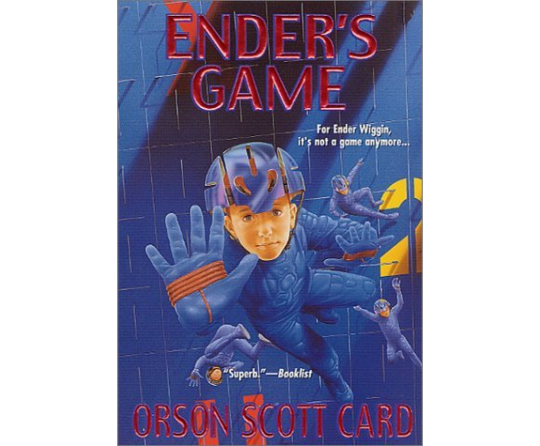
Is Ender Wiggin (pictured above as the little brother from Malcolm in the Middle) guilty of xenocide?
Actually, let's first answer a different, but related, question:
What game does the title "Ender's Game" refer to?
It's not as simple a question as it seems. There are three games that have a prominent role in the plot, all very different from one another.
The obvious answer is the Battle School zero-gravity game, where teams of competitors play glorified laser tag in a big empty cube. In terms of page count, most of the book is dedicated to this game. It's also the game depicted on the cover of the edition above.
Yet this game vanishes during the story's climax, when Ender is given a new game to play, a game he is told is a simulator of spaceship warfare. This "game" turns out to not be a game at all, though; after annihilating the alien homeworld in the final stage, Ender learns that he was actually commanding real ships against real enemies the whole time, and that he just singlehandedly ended the Human-Bugger war forever via total xenocide of the aliens. This is both the final game and the most consequential to the plot, despite the short amount of time it appears.
There's also a third game, a single-player video game Ender plays throughout the story. The game is procedurally generated by an AI to respond to the player's emotional state, and is used as a psychiatric diagnostic for the players. Of the three games, this is the one that probes deepest into Ender's psyche, that most defines him as a person; it's also the final image of the story, as the aliens build a facsimile of its world in reality after psychically reading Ender's mind while he xenocides them.
Because all three games are important, the easiest answer might be that the question doesn't matter, that the story is called Ender's Game not to propose this question at all but simply because the technically more accurate "Ender's Games" would improperly suggest a story about a serial prankster.
Fine. But why does the title use the possessive "Ender's" at all?
He does not own any of these games. He did not create them. He does not facilitate them. All of these games, even the simulator game, predate his use of them as a player, were not designed with him in mind, were intended to train and assess potential commanders for, ostensibly, the hundred years since the last Human-Bugger war.
It's in this question that we get to the crux of what defines Gamer literature.
These games are Ender's games because he dominates them into being about him. He enters a rigidly-defined, rules-based system, and excels so completely that the games warp around his presence. In the Battle School game, the administrators stack the odds against Ender, thereby rendering every other player's presence in the game irrelevant except in their function as challenges for Ender to overcome. The administrators acknowledge this in an argument among themselves:
"The game will be compromised. The comparative standings will become meaningless." [...] "You're getting too close to the game, Anderson. You're forgetting that it is merely a training exercise." "It's also status, identity, purpose, name; all that makes these children who they are comes out of this game. When it becomes known that the game can be manipulated, weighted, cheated, it will undo this whole school. I'm not exaggerating." "I know." "So I hope Ender Wiggin truly is the one, because you'll have degraded the effectiveness of our training method for a long time to come."
In this argument, Anderson views the game the way games have been viewed since antiquity: exercises in acquiring honor and status. This honor is based on the innate fairness inherent to games as rule-based systems, which is why in ancient depictions of sport the chief character is often not a competitor but the host, who acts as referee. In Virgil's Aeneid, for instance, the hero Aeneas hosts a series of funeral games (the games themselves intended as an honor for his dead father). Despite being the principal character of the epic, Aeneas does not compete in these games. Instead, he doles out prizes to each competitor based on the worthiness they display; his fairness marks him symbolically as a wise ruler. The Arthurian tournament is another example, where Arthur as host is the principal character, and the knights (Lancelot, Tristan, etc.) who compete do so primarily to receive honors from him or his queen.
In Ender's Game, it is the antagonistic figure Bonzo Madrid who embodies this classical concept of honor; the word defines him, is repeated constantly ("his Spanish honor"), drives his blistering hatred of Ender, who receives both unfair boons and unfair banes from the game's administrators, who skirts the rules of what is allowed to secure victory. Bonzo is depicted as a stupid, bull-like figure; his honor is ultimately worthless, trivially manipulated by Ender in their final fight.
Meanwhile, it's Ender's disregard for honor, his focus solely on his namesake -- ending, finishing the game, the ends before the means -- that makes him so valuable within the scope of the story. He is "the one," as Anderson puts it, the solipsistically important Gamer, the Only I Play the Game-r, because the game now matters in and of itself, rather than as a social activity. In the Aeneid and in Arthur, the competitors are soldiers, for whom there is a world outside the game. Their games are not a substitute for war but a reprieve from it, and as such they are an activity meant to hold together the unifying fabric of society. The values Anderson espouses (status, identity, purpose, name) are fundamentally more important in this social framework than winning (ending) is.
Ender's game, as the Goosebumps-style blurb on my 20-year-old book fair edition's cover proclaims, is not just a game anymore. Its competitors are also soldiers, but the game is meant to prepare them for war; the spaceship video game is actual war. And as this is a war for the survival of the human race, as Ender is told, there is no need for honor. The othered enemy must be annihilated, without remorse or mercy.
This ethos of the game as fundamentally important for its own sake pervades Gamer literature beyond Ender's Game. In Sword Art Online (which I wrote an essay on here), dying in the game is dying in real life, and as such, only Kirito's ability to beat the game matters. Like Ender, Kirito is immediately disdained by his fellow players as a "cheater" (oh sorry, I mean a "beater") because he possesses inherent advantages due to being a beta player. In an actual game, a game that is only a game, Kirito's cheat powers would render the game pointless. What purpose does Kirito winning serve if he does it with Dual Wielding, an overpowered skill that only he is allowed to have? But when a game has real stakes, when only ability to win matters, it is possible to disregard fairness and see the cheater as heroic.
This notion of the "cheat power," a unique and overpowered ability only the protagonist has, is pervasive in post-SAO Gamer literature. To those for whom games are simply games, such powers can only be infuriating and obnoxious betrayals of the purpose of games; to those for whom games mean more than just games, for whom games have a primacy of importance, these powers are all that matter.
That's the core conceit of Gamer literature: the idea that the Game is life, that winning is, in fact, everything.
What sets Ender's Game apart from Sword Art Online is that it creates the inverted world where the Game matters above all, but then draws back the curtain to reveal the inversion. The Buggers are, in fact, no longer hostile. They are not planning to invade Earth again, as Ender has been told his entire life. The war, for them, is entirely defensive, and Ender is the aggressor. And due to Ender's singleminded focus on Ending, on winning, on disregarding honor and fairness, he ultimately commits the xenocide, erases an entire sentient species from existence. He wins a game he should never have been playing.
The obvious counterargument, the one I imagine everyone who has read this book thought up the moment I posed the question at the beginning of this essay, is that Ender did not know he was committing xenocide. The fact that the combat simulator game was not a game was withheld from him until afterward. Plus, he was a child.
Salient arguments all. Ones the book itself makes, via Ender's commander, Graff, to absolve him of sin at the end. They're probably even correct, in a legal sense (I'm not a legal scholar, don't quote me), and in a moral sense. In real life, it would be difficult to blame a 10-year-old in those circumstances for what he did. But in the thematic framework of Ender's Game the book, these arguments are completely inadequate.
Ender has been playing a fourth game the entire story. And this is the only game he doesn't win.
A game is defined by its system of control and limitation over the behavior of the players. A game has rules. His whole life, Ender has been playing within the rules of the system of control his military commanders place upon him.
Their control extends even before he was born; as a third child in a draconian two-child-only world, his existence is at the behest of the government. Graff confirms this to Ender's parents when he recruits him to Battle School: "Of course we already have your consent, granted in writing at the time conception was confirmed, or he could not have been born. He has been ours since then, if he qualified." Graff frames this control utterly, in terms of possession: "he has been ours." He does not exaggerate. Since Ender was young, he has had a "monitor" implanted in his body so the army could observe him at all times, assess whether he "qualifies"; even the brief moment the monitor is removed is a test. "The final step in your testing was to see what would happen when the monitor came off," Graff explains after Ender passes the test by murdering a 6-year-old. Conditions are set up for Ender, similar to the unfair challenges established in the Battle School game; he is isolated from his peers, denied practice sessions, held in solitary confinement on a remote planetoid. It's all in service of assessing Ender as "the one."
Ender wins this game in the sense that he does, ultimately, become "the one" -- the one Graff and the other military men want, the xenocider of the Buggers. He fails this game in the sense that he does not break it.
The other three games Ender plays, he breaks. Usually by cheating. In the single-player psychiatry game, when presented with a deliberately impossible challenge where a giant gives him two glasses to pick between, Ender cheats and kills the giant. "Cheater, cheater!" the dying giant shouts. In the Battle School game, Ender is ultimately confronted by insurmountable odds: 2 armies against his 1. He cannot outgun his opponent, so he cheats by using most of his troops as a distraction so five soldiers can sneak through the enemy's gate, ending the game. At the school, going through the gate is traditionally seen as a mere formality, something done ceremonially once the enemy team is wiped out (there's that honor again, that ceremony), but it technically causes a win. Even Anderson, the game's administrator, sees this as a breach of the rules when Ender confronts him afterward.
Ender was smiling. "I beat you again, sir," he said. "Nonsense, Ender," Anderson said softly. "Your battle was with Griffin and Tiger." "How stupid do you think I am?" Ender said. Loudly, Anderson said, "After that little maneuver, the rules are being revised to require that all of the enemy's soldiers must be frozen or disabled before the gate can be reversed."
(I include the first part of that quote to indicate that Ender all along knows who he is really playing this game against -- the administrators, the military men who control every facet of his life.)
Ender beats the war simulator game in a similar fashion. Outnumbered this time 1000-to-1, he uses his soldiers as sacrifices to sneak a single bomb onto the alien's homeworld, destroying it and committing his xenocide. Ender himself sees this maneuver as breaking the rules, and in fact falsely believes that if he breaks the rules he will be disqualified, set free from the fourth game: "If I break this rule, they'll never let me be a commander. It would be too dangerous. I'll never have to play a game again. And that is victory." The flaw in his logic comes not from whether he's breaking the rules of the game, but which game he is breaking the rules of. It's not the fourth game, Ender's game, but the war simulator game, simply a sub-game within the confines of the fourth game, a sub-game the fourth game's administrators want him to break, a sub-game that gives Ender the illusion of control by breaking. When Ender tells his administrators about his plan, the response he receives almost taunts him to do it:
"Does the Little Doctor work against a planet?" Mazer's face went rigid. "Ender, the buggers never deliberately attacked a civilian population in either invasion. You decide whether it would be wise to adopt a strategy that would invite reprisals."
(And if it wasn't clear how much the administrators wanted him to do this all along, the moment he does it, they flood the room with cheers.)
Ender wins his games by cheating -- by fighting the rules of the game itself -- and yet he never cheats at the fourth game, the game of his life.
In this fourth game, he always plays by the rules.
In the inverted world of Gamer lit, where games define everything, including life and death, it's a common, even natural progression for the Gamer to finally confront the game's administrator. Sword Art Online ends when Kirito defeats Akihiko Kayaba, the developer. In doing so, Kirito exceeds the confines of the game, not simply by ignoring its rules and coming back to life after he's killed, but by demonstrating mastery against the game's God. Afterward, Sword Art Online truly becomes Kirito's Game, with nobody else able to lay claim to the possessive. Kirito demonstrates this control at the end of the anime by recreating Sword Art Online's world using its source code, completing the transition into a player-administrator.
(Though I wonder, how much of a class reading could one give to this new brand of Gamer lit? If classical games were told from the perspective of the one who controlled them, then is there not something innately anti-establishment in Kirito overcoming the controller? This is the gist of many other death game stories, like The Hunger Games, though none of them may be the most sophisticated takes on the subject, more empty fantasy than anything else.)
Ender never fights or defeats his administrators. He never even tries, other than rare periods of depressive inactivity. He doesn't try even though the option is proposed to him by Dink Meeker, an older student whom Ender respects:
"I'm not going to let the bastards run me, Ender. They've got you pegged, too, and they don't plan to treat you kindly. Look what they've done to you so far." "They haven't done anything except promote me." "And she make you life so easy, neh?" Ender laughed and shook his head. "So maybe you're right." "They think they got you on ice. Don't let them." "But that's what I came for," Ender said. "For them to make me into a tool."
Instead, Ender finds comfort in the control exerted on his life. When sent to Earth on leave, he seeks out a lake that reminds him of living in Battle School.
"I spend a lot of time on the water. When I'm swimming, it's like being weightless. I miss being weightless. Also, when I'm here on the lake, the land slopes up in every direction." "Like living in a bowl." "I've lived in a bowl for four years."
Because of this, Ender never cheats against Graff. He could; Graff states several times that Ender is smarter than him, and the fact that they have Ender fighting the war instead of Graff is proof he believes it. But Ender never considers it. He never considers gaming the system of his life.
If Gamer literature emphasizes the inversion of the world order, where games supersede reality in importance (and, as in Sword Art Online, only through this inverted order is one able to claim real power by being a Gamer), then Ender's Game acknowledges both sides of the inversion. For Ender, the games he plays are not simply games anymore. The psychology game, the Battle School game, the war simulator game; all of these he must win at all costs, even if it requires disrespecting the foundational purpose of these games. But his real life? Ender wants that to be a game, craves it to be a game, can't live unless the walls slope up around him like a bowl, can't stand it unless there is a system of control around him. He does what Graff tells him, even though he recognizes immediately that Graff is not his friend, that Graff is the one isolating him from others, rigging things against him. He does what Graff tells him all the way up to and including xenocide, because Ender cannot tell game from real life. That's the core deception at the end: Ender is playing a game that's actually real and he doesn't know it -- or refuses to acknowledge it, since nobody has ever tricked the genius Ender before this point.
Actually, that's not true. They tricked him twice before. Ender twice attacks his peers physically, with brutal violence. The administrators conceal from him that he murdered both his foes; he simply thinks he hurt them. The only way to trick Ender is to do so in a way that insulates him from the consequences of his actions. The only way he will allow himself to be tricked.
So, is Ender guilty of xenocide?
Under it all, Ender believes he is.
The dying Buggers, after reading Ender's mind, recreate the psychology game in the real world. The story ends when Ender finds this recreation, yet another blurring of the lines between game and reality.
The psychology game is different from the other games Ender plays, because nobody expects him to win it. Its purpose is not to be won, simply to assess his mental health. Yet Ender approaches it like the other games, cheats at it and systematically kills all his enemies until he reaches a place called The End of the World. (Another End for Ender.) His drive to win, to dominate, does not come solely from the pressures of the system around him, but from deep within himself, which is what Ender fears the most. But it is here, at The End of the World, where Ender finds atonement, both in the game and in the game-made-real. In the game, he kisses his opponent instead of killing them, and reaches a resolution he is happy with. He stops playing the game after doing this, though the game seems to continue (when an administrator asks him why he stopped playing it, he says "I beat it"; the administrator tells him the game cannot be beaten). It is through this act of love that Ender can escape the game-like system of control that puppeteers him no matter how smart and clever he is or thinks he is.
In the game-made-real, Ender finds his atonement in the same place, The End of the World. The Buggers left for him here, in this place that they (reading his mind) understood as the location of his mercy and compassion, an egg that can repopulate their species. Through this egg, Ender is given the chance to undo his xenocide. But that chance is also contingent on what The End of the World means to Ender, an end to the game, not simply the games he plays but the fourth game, the game of his life. Ender's Game.
757 notes
·
View notes
Text
I was seized with a fervor and could not rest until I illustrated one of my favorite scenes from Sherlock Holmes: the Adventure of the Devil's Foot. While Holmes and Watson take a holiday in the Cornish countryside for Holmes's health, multiple people in the nearby village are found driven mad or dead from horror. Holmes deduces a substance that was burned in their presence is to blame. With a bit of the mysterious powder and a gas lamp in hand, he proposes an experiment to Watson...
content warning for drug use!
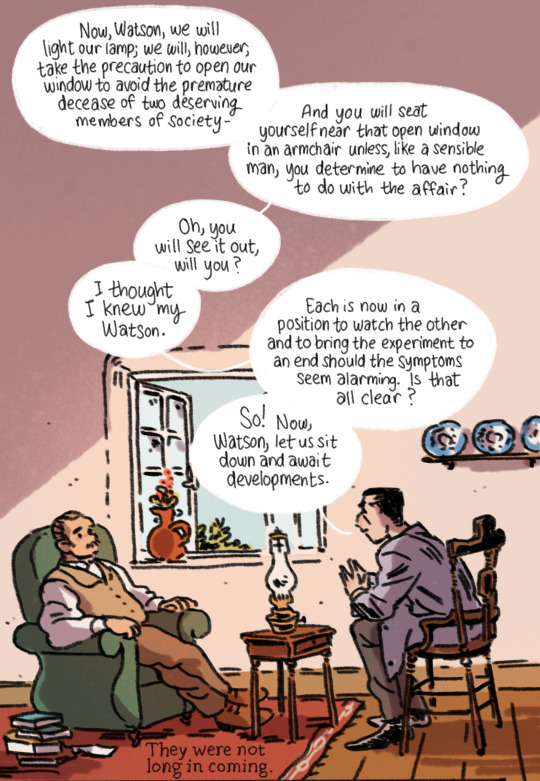
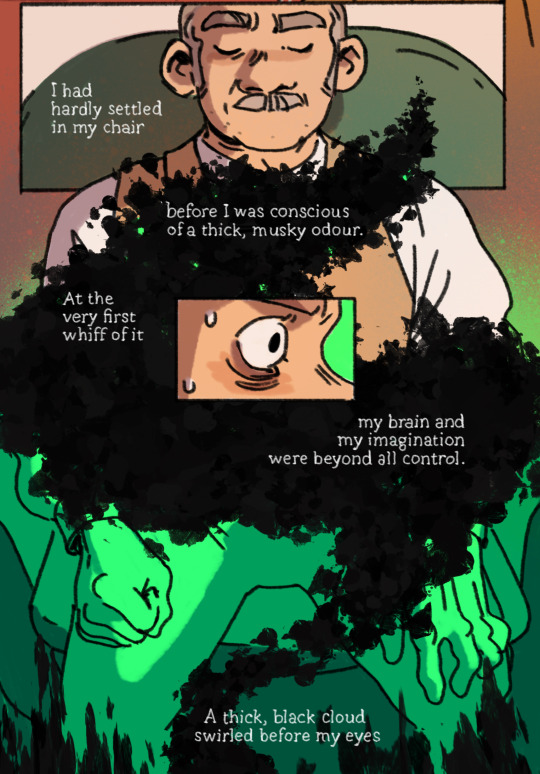
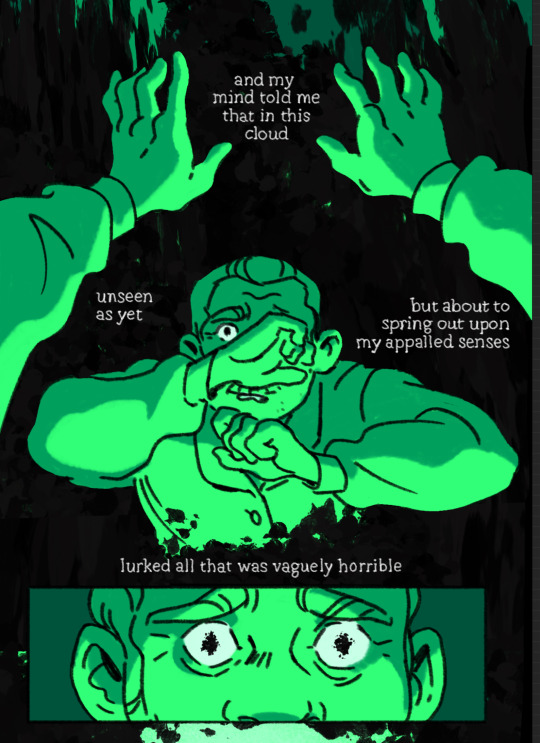
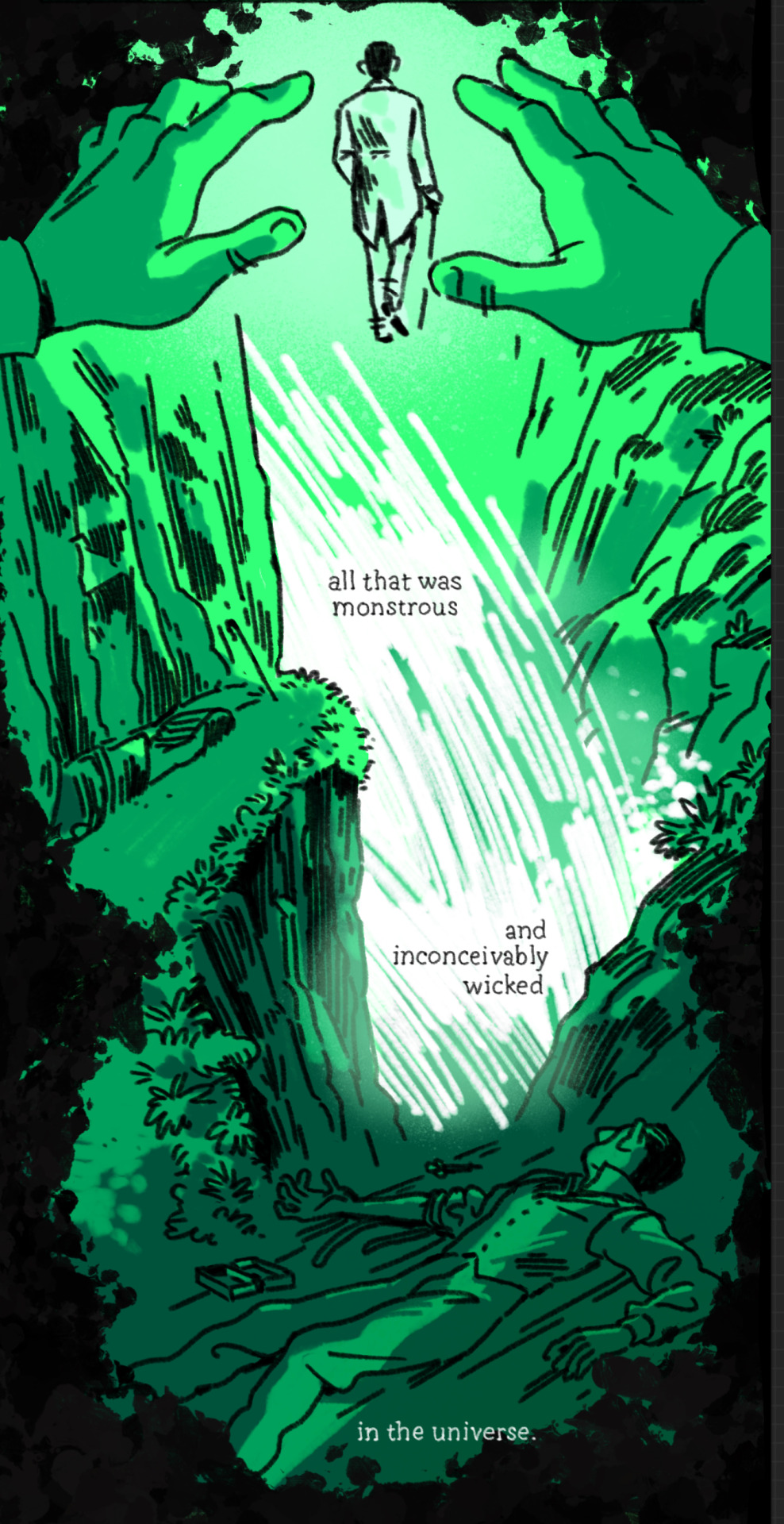
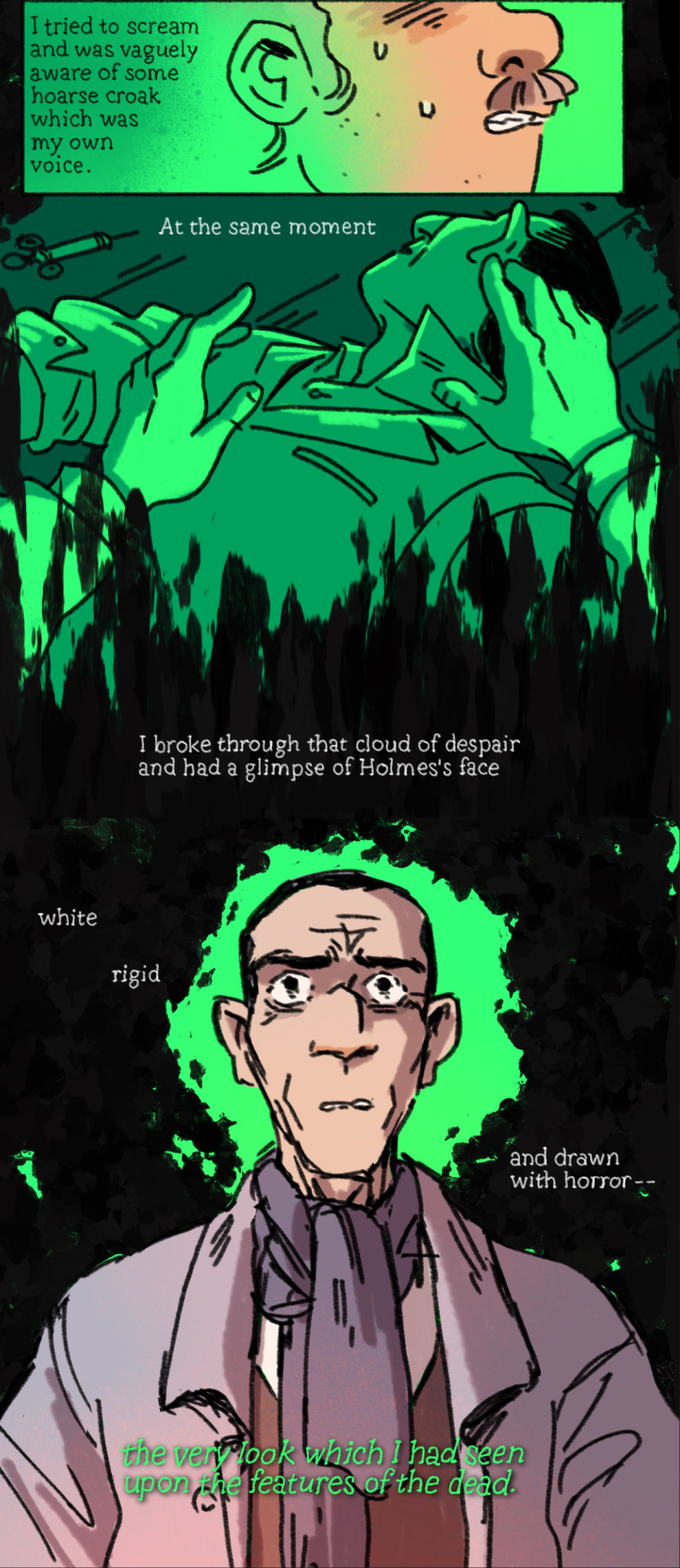
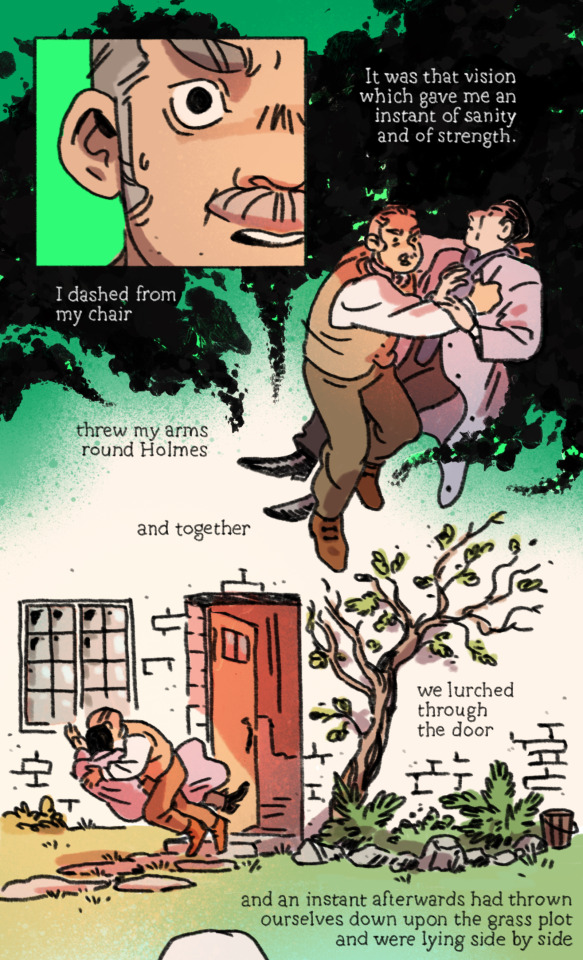
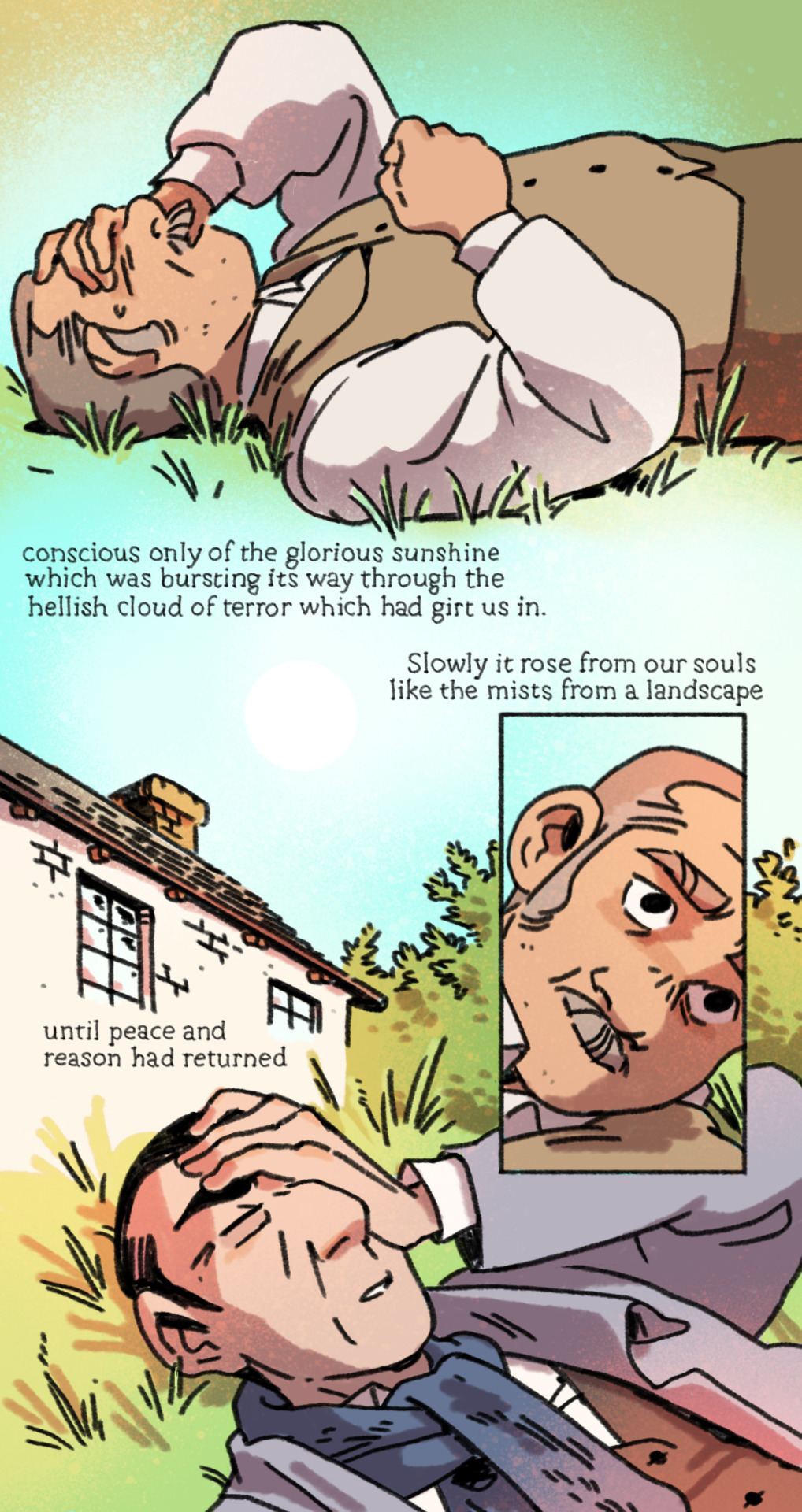
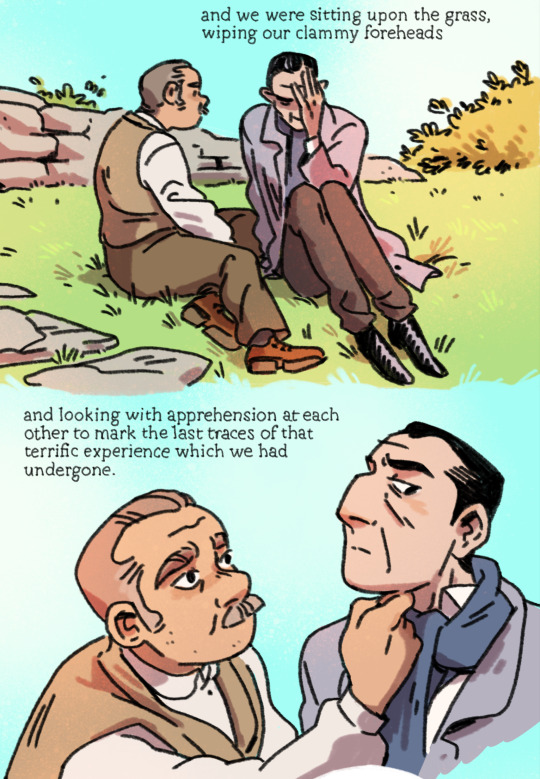
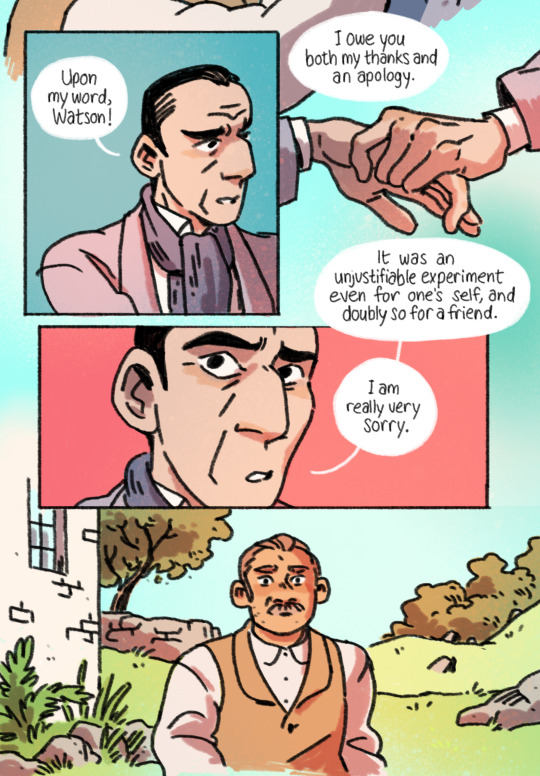
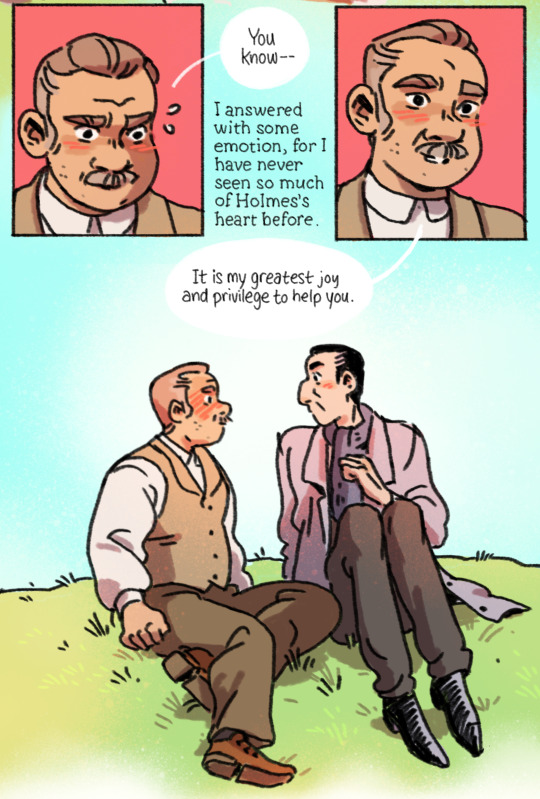
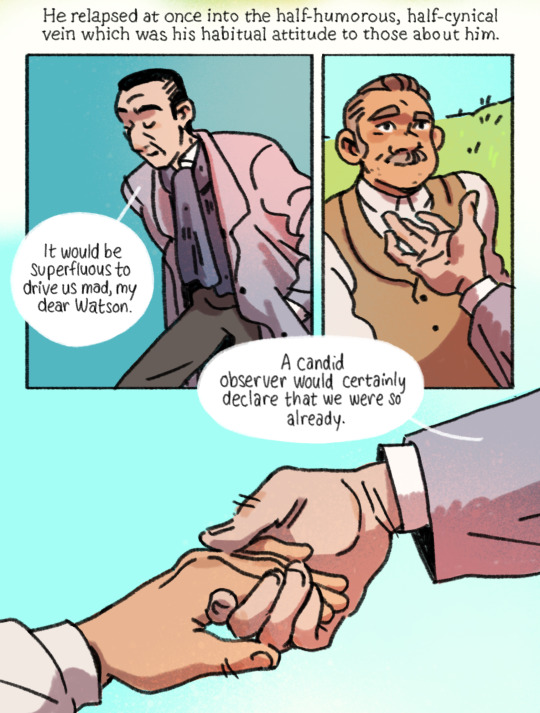
I'm not sure if it's supported by the canon but in my mind this is the first time Holmes ever apologies to Watson and he is so overcome with emotion that he immediately makes it weird
Text under the cut:
"It is not for me, my dear Watson, to stand in the way of the official police force. I leave them all the evidence which I found. The poison still remained upon the talc had they the wit to find it. Now, Watson, we will light our lamp; we will, however, take the precaution to open our window to avoid the premature decease of two deserving members of society, and you will seat yourself near that open window in an armchair unless, like a sensible man, you determine to have nothing to do with the affair. Oh, you will see it out, will you? I thought I knew my Watson. This chair I will place opposite yours, so that we may be the same distance from the poison and face to face. The door we will leave ajar. Each is now in a position to watch the other and to bring the experiment to an end should the symptoms seem alarming. Is that all clear? Well, then, I take our powder--or what remains of it--from the envelope, and I lay it above the burning lamp. So! Now, Watson, let us sit down and await developments."
They were not long in coming. I had hardly settled in my chair before I was conscious of a thick, musky odour, subtle and nauseous. At the very first whiff of it my brain and my imagination were beyond all control. A thick, black cloud swirled before my eyes, and my mind told me that in this cloud, unseen as yet, but about to spring out upon my appalled senses, lurked all that was vaguely horrible, all that was monstrous and inconceivably wicked in the universe. Vague shapes swirled and swam amid the dark cloud-bank, each a menace and a warning of something coming, the advent of some unspeakable dweller upon the threshold, whose very shadow would blast my soul. A freezing horror took possession of me. I felt that my hair was rising, that my eyes were protruding, that my mouth was opened, and my tongue like leather. The turmoil within my brain was such that something must surely snap. I tried to scream and was vaguely aware of some hoarse croak which was my own voice, but distant and detached from myself. At the same moment, in some effort of escape, I broke through that cloud of despair and had a glimpse of Holmes's face, white, rigid, and drawn with horror--the very look which I had seen upon the features of the dead. It was that vision which gave me an instant of sanity and of strength. I dashed from my chair, threw my arms round Holmes, and together we lurched through the door, and an instant afterwards had thrown ourselves down upon the grass plot and were lying side by side, conscious only of the glorious sunshine which was bursting its way through the hellish cloud of terror which had girt us in. Slowly it rose from our souls like the mists from a landscape until peace and reason had returned, and we were sitting upon the grass, wiping our clammy foreheads, and looking with apprehension at each other to mark the last traces of that terrific experience which we had undergone.
"Upon my word, Watson!" said Holmes at last with an unsteady voice, "I owe you both my thanks and an apology. It was an unjustifiable experiment even for one's self, and doubly so for a friend. I am really very sorry."
"You know," I answered with some emotion, for I have never seen so much of Holmes's heart before, "that it is my greatest joy and privilege to help you."
He relapsed at once into the half-humorous, half-cynical vein which was his habitual attitude to those about him. "It would be superfluous to drive us mad, my dear Watson," said he. "A candid observer would certainly declare that we were so already before we embarked upon so wild an experiment. I confess that I never imagined that the effect could be so sudden and so severe." He dashed into the cottage, and, reappearing with the burning lamp held at full arm's length, he threw it among a bank of brambles. "We must give the room a little time to clear. I take it, Watson, that you have no longer a shadow of a doubt as to how these tragedies were produced?"
6K notes
·
View notes
Text
The Red-Headed League - Part 2
Part One here!






POV: you stage a murder mystery style reveal to address your ex's self confidence issues
This is in the Watson's Sketchbook series!
1K notes
·
View notes
Text

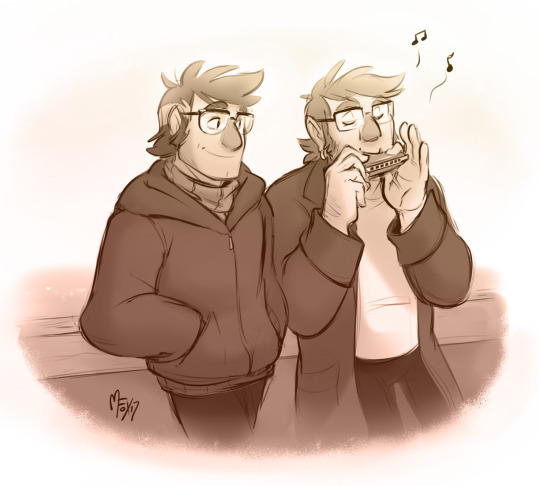




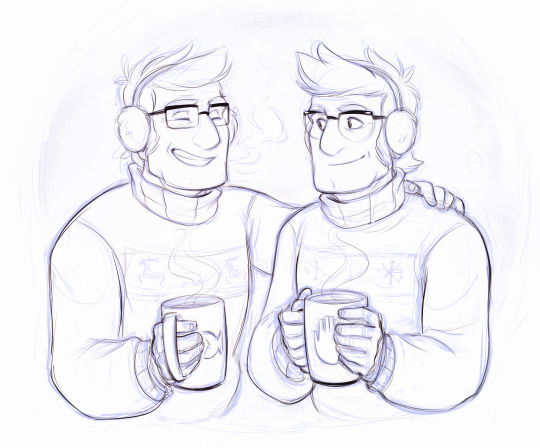
if I recall today's the Stan twins' birthday so here's a small post/dump with a few bros-centric sketches I did years ago (most of those were actually gifts for fellow fandom folks ^^); hbd bois <3
2K notes
·
View notes
Text






many many birthdays apart and a million more together
4K notes
·
View notes
Text
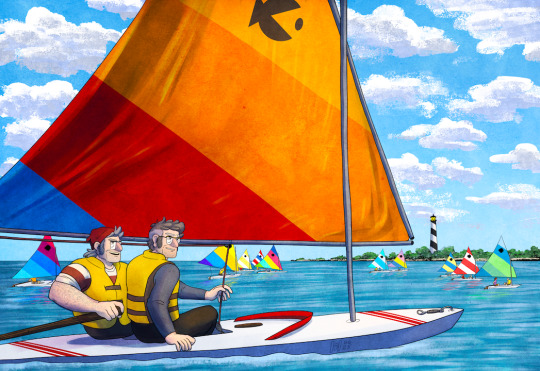

[ID. Above, a color illustration of Stan and Ford pines on a small sailboat. They're sailing on a bay, with an island in the distance, and the Glass Shard Beach lighthouse is visible. There are a lot of other small sailboats with colorful sails out on the bay as well. End ID.]
HAPPY BIRTHDAY to Stan and Ford!
And of course, happy 13th anniversary of the Gravity Falls premiere!
When I was a kid, you'd see these colorful Sunfish sailboats out on the bay all the time; I was always entranced by the pretty sail patterns. I never did get sailing lessons, though. I don't know why; maybe because I never told my parents I was interested? I wish I had, though. I think it would be fun to learn. Maybe I should look into small sailboat lessons in my area.
Obviously, a little Sunfish isn't the kind of sailboat you can take on adventures around the world! But as good Jersey boys, I bet Stan and Ford would enjoy an afternoon out on the water.
(I looked at so many refs of Sunfish sailboats and people sailing them. You wouldn't think they'd be big enough for two adults, but apparently so!)
846 notes
·
View notes
Text
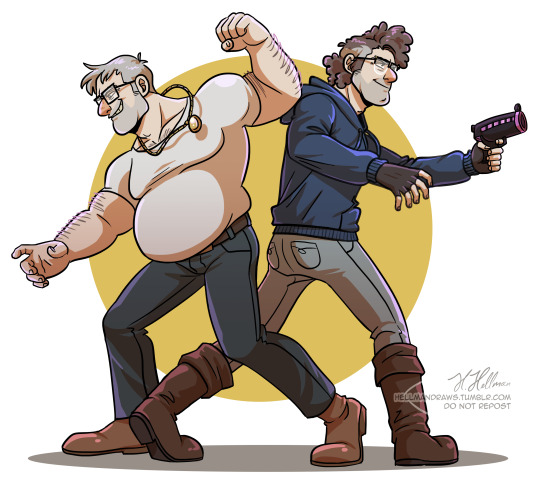
The boys are fightiiiiing~!! (but not each other for once)
Happy Staniversary, my fellow grunkle enjoyers! 🫡
2K notes
·
View notes
Text
terrible idea of the day: story titled achillean heel about mlm rival wrestlers that commit so hard to the kayfabe that they fall in love
0 notes
Text
attempting to find old fanfic by reverse-sourcing from broken links on fandom memes and having. a time :((( god it sucks when archival shit just blinks away whenever the collated lists of it aren't at stable places. argh argh arghhh :((((
1 note
·
View note
Text
If we wanted to engage in nuance (lol, lmao) on the "are audiobooks reading" debate, we really do need to bring literacy, and especially blind literacy, into the conversation.
Because, yes, listening to a story and reading a story use mostly the same parts of the brain. Yes, listening to the audiobook counts as "having read" a book. Yes, oral storytelling has a long, glorious tradition and many cultures maintained their histories through oral history or oral + art history, having never developed a true written language, and their oral stories and histories are just as valid and rich as written literature.
We still can't call listening in the absence of reading "literacy."
The term literacy needs to stay restricted to the written word, to the ability to access and engage with written texts, because we need to be able to talk about illiteracy. We need to be able to identify when a society is failing to teach children to read, and if we start saying that listening to stories is literacy, we lose the ability to describe those systemic failures.
Blind folks have been knee-deep in this debate for a long time. Schools struggle to provide resources to teach students Braille and enforcing the teaching of Braille to low-vision and blind children is a constant uphill battle. A school tried to argue that one girl didn't need to learn Braille because she could read 96-point font. Go check what that is. The new prevalence of audiobooks and TTS is a huge threat to Braille literacy because it provides institutions with another excuse to not provide Braille education or Braille texts.
That matters. Braille-literate blind and low-vision people have a 90% employment rate. For those who don't know Braille, it's 30%. Braille literacy is linked to higher academic success in all fields.
Moving outside the world of Braille, literacy of any kind matters. Being able to read text has a massive impact on a person's ability to access information, education, and employment. Being able to talk about the inability to read text matters, because that's how we're able to hold systems accountable.
So, yes, audiobooks should count as reading. But, no, they should not count as literacy.
22K notes
·
View notes
